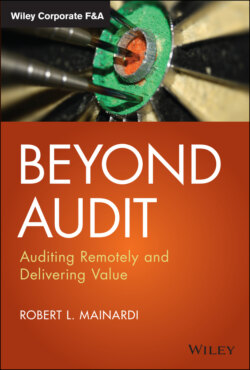Читать книгу Beyond Audit - Robert L. Mainardi - Страница 23
AUDIT WRAP-UP
ОглавлениеThe final point to review before we leave the audit approach discussion during a remote audit is the wrap-up phase. This is not usually considered an official audit phase, as most groups consider the audit to only consist of planning, fieldwork, and reporting. Now, I know how it feels when the audit report gets finalized and distributed. There is a definite sigh of relief that the audit is complete, and you have almost certainly moved on to the next project on the list. But is the audit really complete and over? The answer to that is no. There is file clean-up, survey distribution, lessons learned, and annual risk assessment updating (if required). File clean-up includes an internal review to ensure all audit sections are complete with the proper testing referencing and required sign-offs are evidence on all work performed. Lessons learned is an audit team–only meeting where the participants on the remote audit discuss critical aspects of the audit, such as how well did we plan, use technology where applicable, develop audit testing linked to the business objective, and productively foster the audit and business relationship. The lessons learned can be compared and used in unison with the audit client survey results to identify gaps in the audit process and suggest audit methodology revisions to strengthen audit execution.
While these items in wrap-up phase are for the most part an internal exercise for the audit team, the audit survey process is still a critical outstanding item that impacts the audit and business partner relationship. The survey itself should have a targeted distribution. Many times, audit teams make the mistake of sending the survey out to the executive over the business process that was just examined and possibly including the business manager over the unit. However, if the audit team truly wants to solicit feedback on how well the audit was planned, the fieldwork was executed, and the report was generated, then you should be reaching out to the key business personnel contacts that the audit team interacted with during this challenging remote audit. Simply sending the audit survey to the executive or manager over the area being audited is not going to provide you with an honest assessment of how well the audit went or how effective communication was throughout the audit. That is going to require a different distribution to unfiltered feedback on audit's performance during this remote review.
Audit surveys should be limited on the number of questions asked but require two responses to each question. The response should first require how important the item referenced in the question was to the business partner and, second, determine how well the audit succeeded in that effort. Additionally, the survey should include specific questions related to not only to the effectiveness of audit's communication but also the frequency of said communications. Communication will always be at the foundation for success for auditors and should be recognized as the cornerstone in your department and a mandatory core competency for every audit team member. The communication cornerstone concept will be discussed in Chapter 10. Without effective communication, audit execution and success, especially on remote reviews, will not be effective and will take much longer to complete.
